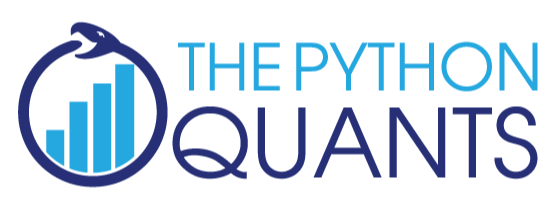|
# |
|
# tpqoa is a wrapper class for the |
|
# Oanda v20 API (RESTful & streaming) |
|
# (c) Dr. Yves J. Hilpisch |
|
# The Python Quants GmbH |
|
# |
|
# dependencies: |
|
# pip install v20 |
|
# conda install pyyaml |
|
# |
|
import v20 |
|
import pandas as pd |
|
import datetime as dt |
|
import configparser |
|
|
|
class tpqoa(object): |
|
''' tpqoa is a Python wrapper class for the Oanda v20 API. ''' |
|
|
|
def __init__(self, conf_file): |
|
''' Init function expecting a configuration file with |
|
the following content: |
|
|
|
[oanda_v20] |
|
account_id = XYZ-ABC-... |
|
access_token = ZYXCAB... |
|
|
|
Parameters |
|
========== |
|
conf_file: string |
|
path to and filename of the configuration file, e.g. '/home/me/oanda.cfg' |
|
''' |
|
self.config = configparser.ConfigParser() |
|
self.config.read(conf_file) |
|
self.access_token = self.config['oanda_v20']['access_token'] |
|
self.account_id = self.config['oanda_v20']['account_id'] |
|
self.ctx = v20.Context( |
|
hostname='api-fxpractice.oanda.com', |
|
port=443, |
|
ssl=True, |
|
application='sample_code', |
|
token=self.access_token, |
|
datetime_format='RFC3339') |
|
self.ctx_stream = v20.Context( |
|
hostname='stream-fxpractice.oanda.com', |
|
port=443, |
|
ssl=True, |
|
application='sample_code', |
|
token=self.access_token, |
|
datetime_format='RFC3339' |
|
) |
|
self.suffix = '.000000000Z' |
|
|
|
def get_instruments(self): |
|
''' Retrieves and returns all instruments for the given account. ''' |
|
resp = self.ctx.account.instruments(self.account_id) |
|
instruments = resp.get('instruments') |
|
instruments = [ins.dict() for ins in instruments] |
|
instruments = [(ins['displayName'], ins['name']) |
|
for ins in instruments] |
|
return instruments |
|
|
|
def transform_datetime(self, dt): |
|
''' Transforms Python datetime object to string. ''' |
|
if isinstance(dt, str): |
|
dt = pd.Timestamp(dt).to_pydatetime() |
|
return dt.isoformat('T') + self.suffix |
|
|
|
def retrieve_data(self, instrument, start, end, granularity, price): |
|
raw = self.ctx.instrument.candles( |
|
instrument=instrument, |
|
fromTime=start, toTime=end, |
|
granularity=granularity, price=price) |
|
raw = raw.get('candles') |
|
raw = [cs.dict() for cs in raw] |
|
for cs in raw: |
|
cs.update(cs['ask']) |
|
del cs['ask'] |
|
if len(raw) == 0: |
|
return pd.DataFrame() # return empty DataFrame is no data |
|
data = pd.DataFrame(raw) |
|
data['time'] = pd.to_datetime(data['time']) |
|
data = data.set_index('time') |
|
data.index = pd.DatetimeIndex(data.index) |
|
for col in list('ohlc'): |
|
data[col] = data[col].astype(float) |
|
return data |
|
|
|
def get_history(self, instrument, start, end, |
|
granularity, price): |
|
''' Retrieves historical data for instrument. |
|
|
|
Parameters |
|
========== |
|
instrument: string |
|
valid instrument name |
|
start, end: datetime, str |
|
Python datetime or string objects for start and end |
|
granularity: string |
|
a string like 'S5', 'M1' or 'D' |
|
price: string |
|
one of 'A' (ask) or 'B' (bid) |
|
|
|
Returns |
|
======= |
|
data: pd.DataFrame |
|
pandas DataFrame object with data |
|
''' |
|
if granularity.startswith('S'): |
|
data = pd.DataFrame() |
|
dr = pd.date_range(start, end, freq='4h') |
|
for t in range(len(dr) - 1): |
|
start = self.transform_datetime(dr[t]) |
|
end = self.transform_datetime(dr[t + 1]) |
|
batch = self.retrieve_data(instrument, start, end, |
|
granularity, price) |
|
data = data.append(batch) |
|
else: |
|
start = self.transform_datetime(start) |
|
end = self.transform_datetime(end) |
|
data = self.retrieve_data(instrument, start, end, |
|
granularity, price) |
|
|
|
return data[['o', 'h', 'l', 'c', 'complete', 'volume']] |
|
|
|
def create_order(self, instrument, units): |
|
''' Places order with Oanda. |
|
|
|
Parameters |
|
========== |
|
instrument: string |
|
valid instrument name |
|
units: int |
|
number of units of instrument to be bought (positive int, eg 'units=50') |
|
or to be sold (negative int, eg 'units=-100') |
|
''' |
|
request = self.ctx.order.market( |
|
self.account_id, |
|
instrument=instrument, |
|
units=units, |
|
) |
|
order = request.get('orderFillTransaction') |
|
print('\n\n', order.dict(), '\n') |
|
|
|
def stream_data(self, instrument, stop=None): |
|
''' Starts a real-time data stream. |
|
|
|
Parameters |
|
========== |
|
instrument: string |
|
valid instrument name |
|
''' |
|
self.stream_instrument = instrument |
|
self.ticks = 0 |
|
response = self.ctx_stream.pricing.stream( |
|
self.account_id, snapshot=True, |
|
instruments=instrument) |
|
for msg_type, msg in response.parts(): |
|
# print(msg_type, msg) |
|
if msg_type == 'pricing.Price': |
|
self.ticks +=1 |
|
self.on_success(msg.time, |
|
float(msg.bids[0].price), |
|
float(msg.asks[0].price)) |
|
if stop is not None: |
|
if self.ticks >= stop: |
|
break |
|
|
|
def on_success(self, time, bid, ask): |
|
''' Method called when new data is retrieved. ''' |
|
print(time, bid, ask) |
|
|
|
def get_account_summary(self, detailed=False): |
|
''' Returns summary data for Oanda account.''' |
|
if detailed is True: |
|
response = self.ctx.account.get(self.account_id) |
|
else: |
|
response = self.ctx.account.summary(self.account_id) |
|
raw = response.get('account') |
|
return raw.dict() |
|
|
|
def get_transactions(self, tid=0): |
|
''' Retrieves and returns transactions data. ''' |
|
response = self.ctx.transaction.since(self.account_id, id=tid) |
|
transactions = response.get('transactions') |
|
transactions = [t.dict() for t in transactions] |
|
return transactions |
|
|
|
def print_transactions(self, tid=0): |
|
''' Prints basic transactions data. ''' |
|
transactions = self.get_transactions(tid) |
|
for trans in transactions: |
|
templ = '%5s | %s | %9s | %12s' |
|
print(templ % (trans['id'], |
|
trans['time'], |
|
trans['instrument'], |
|
trans['units'])) |

